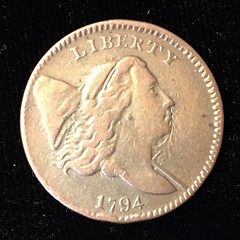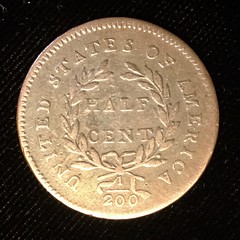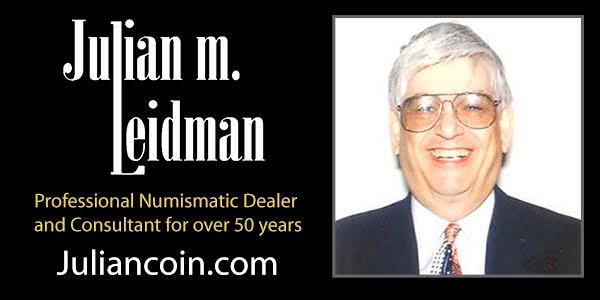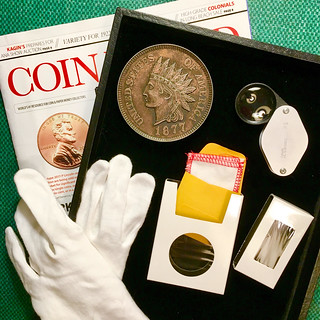
PREV ARTICLE
NEXT ARTICLE
FULL ISSUE
PREV FULL ISSUE
JEFF BURKE'S TIPS FOR SHARING COINS WITH KIDSJeff Burke submitted these thoughts on introducing youngsters to numismatics. Thanks! -Editor
In my job as an instructional aide at Thomas Jefferson Middle School (TJMS) in Rockaway, New Jersey, I work with teachers to help foster an intellectually stimulating and productive learning environment for special needs kids and ESL learners. I have found four effective ways of sharing coins with students. These methods include gifts of inexpensive coins; passing along auction catalogs and other numismatic literature; arranging for kids to have the chance to handle coins from my own collection; and showing interest in seeing the coin collections of young collectors. In early 2015, after a vacation in Peru with my wife, I brought back Peruvian coins of various denominations to share with a class of special needs children. When I learned that one student had developed an interest in collecting wheat cents, I helped him identify the dates and mint marks on numerous specimens. Now he has a burgeoning collection of wheat cents! In 2016, another student told me about his coin collection. I expressed interest in seeing it, so he brought it to school (with discretion) to show me just before the holiday break. He took such joy and delight in showing me individual pieces! A few weeks later, I asked him if he likes to read coin magazines. He responded, “I’ve never had one before.” He was thrilled to receive a recent issue of Coin World from me! I observed him reading it during most of the next lunch period, pausing to show some pictures of coins to a friend sitting next to him. A few days later I gave this student the latest copy of The Numismatist, which caused further excitement! Another day, the child excitedly reported an amazing find to me at lunch. A classmate who was headed to buy a treat in the cafeteria showed him one of the nickels she planned to spend. When he saw it was a 1936-D Buffalo nickel, he promptly bought it from her for 5 cents. He couldn’t wait to show me his acquisition, which was only slightly worn. He has since reported that another classmate started her own coin collection. I was excited to read Shanna Berk Schmidt’s “History in Your Hands Foundation: A New Approach to Teaching History,” in The Asylum, Autumn 2016, pages 40-44. Shanna explains how history can become living stories when students actually handle coins, for example, from the Roman era (refer to www.hiyhf.org for more information). Even when coins are not readily at hand, coin catalogs can provide inspiration. In September 2016, Christine Capen, fifth and sixth grade Social Studies teacher at TJMS, was teaching her students about the Byzantine Empire. To supplement the unit, I gave her a number of ancient and world coin catalogues with Post-its to mark the sections for Byzantine coinage to share with students. Miss Capen then e-mailed the History in Your Hands Foundation for classroom materials. I also gave Christine a shopping bag full of ancient and world coin catalogs in October and another batch in November 2016. (Keep those coin catalogs in circulation!) Recently, Christine - who keeps the catalogs on a shelf in her classroom - told me one kid has been feverishly working his way through the entire stack! Earlier this year, I brought selected examples from my modest coin collection to TJMS to show to Mrs. Dobb’s classes. Janet Dobbs, M. Ed., is a Special Education teacher for grades 6 and 8. In bringing my coins I hoped to awaken in our students some of the wonder and delight I feel in collecting. I am especially passionate about two facets of coin collecting: the preservation of coins, and treasuring the distinctive details that give each coin in my cabinet its own personality. Naturally, my time with the kids that day inclined towards these themes.   After showing students my Intercept Shield ten-slab storage box with its smaller individual boxes, I explained how each coin is a small piece of history and we are caretakers of that history for future generations. To appreciate how old the coins really are, I had them calculate the ages of some of the specimens as a math exercise. One girl commented on how well I’ve taken care of my coins. In turn, I was impressed to find that the students were very respectful toward the coins and handled them with great care. I had them wear cotton gloves to hold the early coppers. The kids were very excited to put on their gloves! Several asked if they could keep the gloves after the coin exercise. They took turns examining each coin over a black velvet jeweler’s tray. One eighth grader even held his breath while examining an early copper so he wouldn’t breathe on it! To introduce them to the distinctive appeal of each coin, I guided them in using my magnifying glass to examine the hair and eye details on these early coppers, which included a raw 1794 C2a half cent in VF 20, and a raw 1794 S-31 large cent in 40/25. I pointed out the 1/100 and 1/200 fraction bars on the reverse sides of the large and half cents, tying the coins in with our discussion of fractions in math class with Mrs. Dobbs. The kids were very curious about the value of each piece, so I discussed price ranges for a few pieces and also noted the sentimental value of my coins based on their stories. To build up to the 1877 Indian Head cent, I mentioned that due to its low mintage, this coin was already scarce the day it was minted. The growing popularity of this coin resulted in it being depicted on a U.S. postage stamp in 1978 and other non-numismatic items such as Avon bottles. A key prop for this event was a metal coaster designed as an oversized 1877 Indian Head cent which helped the children understand the significance of this coin. We examined an 1877 Indian Head Cent PCGS EF 45, and a 1909-S IHC NGC MS 64 BN. It was quite a thrill for me to share my precious coins with these students! TJMS Principal Stephanie Bonaparte decided to post some pictures Janet took of our coin activity on the TJMS Facebook page. Even though I was nervous about bringing my coin collection to school, I discovered that our students enthusiastically rose to the occasion. Knowing how technologically savvy kids are, I have searched the Internet for websites that could also help spur their interest in coin collecting. Two engaging sites are:
We need to develop more interactive websites, social media and educational games to pique student interest in collecting coins and numismatic literature. For example, there are plenty of apps for numismatists to help organize their collections and conduct bourse treasure hunts. However, there remains a dearth of coin apps for kids! Remember the joy of your early experiences with coins and numismatic books? Recapturing that with kids will inspire them as they begin their own journeys. Both traditional, one-on- one activities and creative new virtual experiences can help children today dive into the world of numismatics. May their adventures (and ours!) long continue. Great ideas, and excellent results! We can all take some inspiration from Jeff's experience. We can always be doing more to help inspire the next generation of collectors.
-Editor
 Wayne Homren, Editor The Numismatic Bibliomania Society is a non-profit organization promoting numismatic literature. See our web site at coinbooks.org. To submit items for publication in The E-Sylum, write to the Editor at this address: whomren@gmail.com To subscribe go to: https://my.binhost.com/lists/listinfo/esylum All Rights Reserved. NBS Home Page Contact the NBS webmaster 
|
